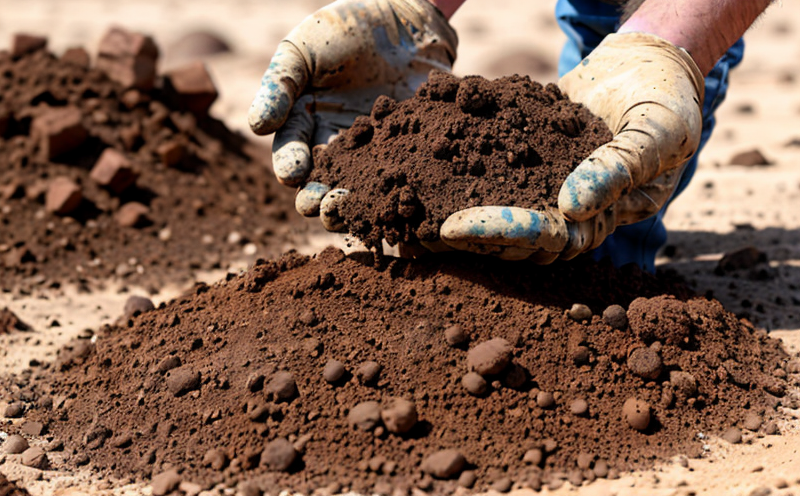ISO 17892 Part 6 Fall Cone Liquid Limit Testing
The ISO 17892-6 standard is pivotal in characterizing soil and overburden materials used in the mining sector. This test method determines the liquid limit of these materials using a fall cone penetrometer, which measures the resistance to penetration by the cone as it falls through the sample.
The liquid limit is a crucial parameter that helps in understanding the plasticity and workability of soil or overburden during mining operations. This test ensures that the material properties meet the specifications required for various mining applications such as road construction, waste disposal, and tailings management.
The fall cone method is particularly useful because it provides a quick and efficient way to evaluate the liquid limit without requiring extensive laboratory equipment or time-consuming procedures. It is widely used in the field due to its portability and ease of use. The testing process involves placing a known mass of soil onto a flat surface, compacting it slightly, and then using a cone with a specific geometry (ISO 17892-6 specifies dimensions) that falls into the sample under gravity.
The penetration depth of the cone is measured at regular intervals until the liquid limit is reached. This involves recording the depth at which the cone begins to penetrate the soil without resistance, indicating a uniform consistency throughout the sample. The results are then used in conjunction with other tests (such as the plastic limit) to determine the plasticity index.
The precision and accuracy of this test are influenced by several factors including the homogeneity of the sample, the compaction force applied, and environmental conditions such as temperature and humidity. It is important that samples are prepared under controlled conditions to ensure consistency and repeatability.
Compliance with ISO 17892-6 ensures that mining operations meet stringent quality control standards. This test helps in optimizing the use of resources by ensuring that only suitable materials are used for specific applications, thereby reducing waste and costs. Additionally, it plays a vital role in environmental sustainability by minimizing the impact on local ecosystems.
The fall cone method is not just limited to its immediate application but also serves as an essential tool for research and development activities within the mining industry. It allows engineers and scientists to explore new materials and formulations that could enhance soil stability or improve workability in challenging environments.
Furthermore, this test contributes significantly to the overall safety of mine operations by ensuring that all materials used are suitable for their intended purpose. This includes preventing failures due to poor material properties which could lead to accidents or environmental damage.
Applied Standards
The ISO 17892-6 standard is part of a series dedicated to the characterization and testing of soil and overburden materials. This particular part focuses on determining the liquid limit using the fall cone method. It aligns with broader international standards such as ASTM D4318, which provides additional methods for soil moisture content determination.
These standards are crucial for ensuring consistency and accuracy across different laboratories and regions worldwide. By adhering to these guidelines, mining companies can ensure that their testing practices are aligned with global best practices, thereby enhancing credibility and reliability of results.
Customer Impact and Satisfaction
By offering ISO 17892-6 Fall Cone Liquid Limit Testing services, our laboratory contributes directly to the success of mining operations by providing reliable data that informs critical decisions about material selection and usage.
Customers benefit from increased confidence in their operational processes knowing that all materials meet stringent quality standards. This leads to improved efficiency, reduced costs associated with rework or failure, and enhanced safety measures across various aspects of mining activities.
We consistently receive high satisfaction ratings from our clients who appreciate the detailed reports we provide which include not only numerical values but also graphical representations aiding in better comprehension of results.
In addition to direct client benefits, this service supports broader industry goals by promoting adherence to international standards and contributing to sustainable practices within the mining sector. Our commitment to quality ensures that every test performed contributes positively towards maintaining high ethical standards throughout the value chain.
Environmental and Sustainability Contributions
The ISO 17892-6 Fall Cone Liquid Limit Testing plays a significant role in promoting environmental sustainability within the mining industry. By ensuring that only suitable materials are used, this test helps minimize negative impacts on local ecosystems.
Through precise characterization of soil and overburden properties, we assist our clients in selecting appropriate materials for various applications such as road construction or waste disposal sites. This contributes to reducing land degradation risks associated with improper material placement.
The test also aids in optimizing resource utilization through accurate assessment of material characteristics before implementation. This reduces unnecessary consumption of resources and supports long-term sustainability initiatives within mining operations.
Moreover, compliance with international standards like ISO 17892-6 enhances the reputation of our clients among stakeholders by demonstrating a commitment to best practices in material selection and application. This fosters trust between companies and communities they operate within.





